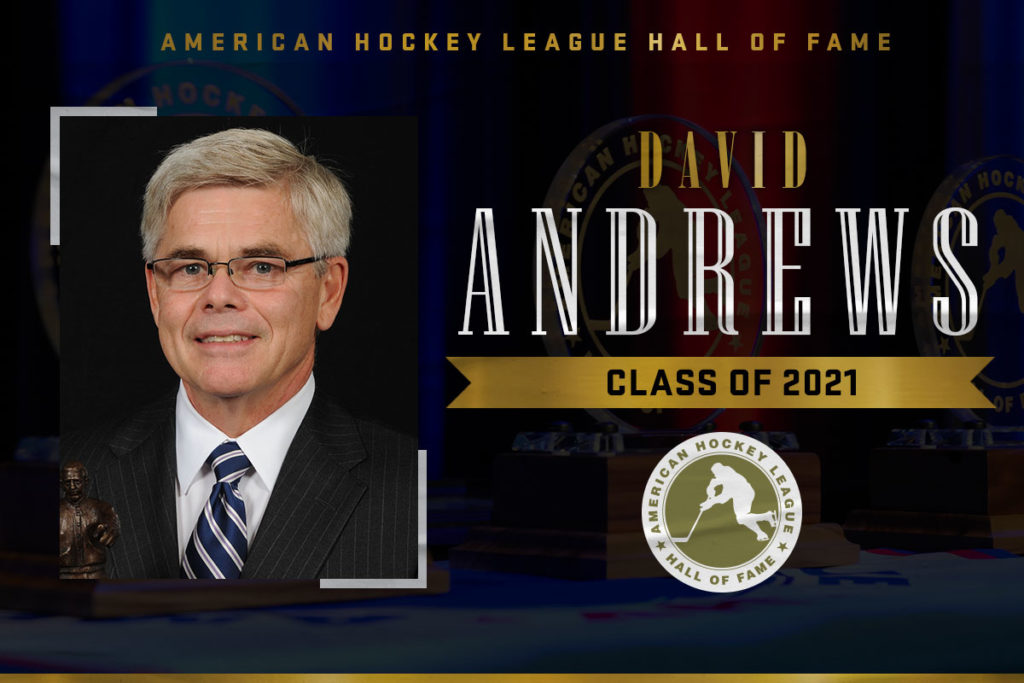
David Andrews was elected to the position of President and CEO on July 7, 1993, and took office the following year, succeeding Hockey Hall of Famer Jack Butterfield. His 26-year tenure at the helm of the AHL established Andrews as one of the most influential executives in hockey and all of professional sports.
Andrews grew the AHL exponentially and significantly redefined its mission, expanding the league’s footprint from a regional 16-team circuit to a 31-team league stretching from coast to coast with every AHL franchise serving as the exclusive primary development affiliate for a National Hockey League organization.
From the time he assumed the role of President, Andrews dramatically re-positioned the league by attracting new member cities, recruiting new ownership and forging new development partnerships with all 32 NHL organizations, managing more than 230 transactions impacting member clubs’ locations, ownership and NHL affiliation agreements. In a challenging economic climate and a competitive pro hockey landscape, Andrews strategically managed and grew an AHL which continues to impact the development of nearly 90 percent of the players and virtually all of the coaches, managers and officials in the NHL.
In 2001, Andrews led an expansion which resulted in the absorption of six franchises and the dissolution of the AHL’s long-time competitor, the International Hockey League. And in 2015, Andrews negotiated and brought to a successful outcome the complex process of relocating teams into five markets in California, an enterprise which has since expanded further into Arizona, Colorado, Nevada and British Columbia, and continues to develop and strengthen the game in the western United States.
Andrews contributed to the growth of hockey by playing a leadership role in rules innovations — such as hybrid icing and 4-on-4 and later 3-on-3 overtime play — and player safety initiatives. During his time as President, the AHL instituted safety standards relative to head checking and checking from behind; introduced mandatory visors for all skaters; and provided a safer environment for its players by adopting a modified schedule that reduced the number of games played, increased the length of the playing calendar and eliminated sequences of teams playing four games in five days.
On the business front, Andrews grew corporate and broadcast partnerships to new levels, built strong platforms for the league’s special events such as the All-Star Classic and Calder Cup Finals, and oversaw dramatic increases in league-wide revenues and franchise values.
A native of Nova Scotia, Andrews served on the Board of Governors as the Edmonton Oilers’ director of AHL operations for seven years (1987-94), building the Cape Breton Oilers franchise into one of the most successful AHL clubs both on and off the ice – contributing to two Stanley Cup championships (1988, 1990) and the 1993 Calder Cup title. Andrews received the James C. Hendy Award as the AHL’s outstanding executive in 1990.
Andrews was awarded the Lester Patrick Trophy in 2010 for contributions to hockey in the United States, as well as USA Hockey’s Distinguished Achievement Award in 2020. He was presented with the Good Guy Award by the Ace Bailey Children’s Foundation in 2011, and has been honored with induction into both the British Columbia Hockey Hall of Fame and the Nova Scotia Sport Hall of Fame. In 2020, Andrews earned the Thomas Ebright Award for outstanding career contributions to the AHL.
